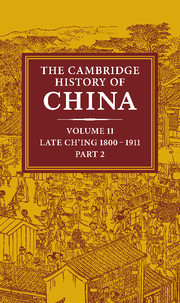Book contents
- Frontmatter
- 1 Economic trends in the late Ch'ing empire, 1870–1911
- 2 Late Ch'ing foreign relations, 1866–1905
- 3 Changing Chinese views of Western relations, 1840–95
- 4 The military challenge: the north-west and the coast
- 5 Intellectual change and the reform movement, 1890–8
- 6 Japan and the chinese revolution of 1911
- 7 Political and institutional reform 1901–11
- 8 Government, merchants and industry to 1911
- 9 The republican revolutionary movement
- 10 Currents of social change
- Bibliographical essays
- Bibliography
- Index
- Map 1. Ch’ing empire – physical features
- References
7 - Political and institutional reform 1901–11
Published online by Cambridge University Press: 28 March 2008
- Frontmatter
- 1 Economic trends in the late Ch'ing empire, 1870–1911
- 2 Late Ch'ing foreign relations, 1866–1905
- 3 Changing Chinese views of Western relations, 1840–95
- 4 The military challenge: the north-west and the coast
- 5 Intellectual change and the reform movement, 1890–8
- 6 Japan and the chinese revolution of 1911
- 7 Political and institutional reform 1901–11
- 8 Government, merchants and industry to 1911
- 9 The republican revolutionary movement
- 10 Currents of social change
- Bibliographical essays
- Bibliography
- Index
- Map 1. Ch’ing empire – physical features
- References
Summary
THE REFORM EDICT OF THE KUANG-HSU EMPEROR
When the allied forces seized Peking on 14 August 1900, the Empress Dowager Tz'u-hsi and the Kuang-hsu Emperor evacuated the capital and fled to Sian, where they arrived on 26 October. In early December, high-ranking officials in the capital and the provinces were ordered to submit memorials giving their ideas on governmental, military, educational, financial or any other reforms. On 29 January 1901, the emperor, under the direction of the empress dowager, issued an edict stating that while the three bonds and five relationships were eternal, the method of the government should be changed in accordance with the times. In this edict the deeply rooted evils of China were summarized as follows:
‘The weakness of China is caused by the strength of convention and the rigid network of regulations. We have many mediocre officials but few men of talent and courage. The regulations are used by the mediocre men as the means of their self-protection, and taken advantage of by the government clerks as sources of profit. The government officials exchange numerous documents but they never touch reality. The appointment of men of talent is restricted by regulations which are so rigid that even men of extraordinary talent are missed. What misleads the country can be expressed in one word, selfishness (ssu) and what suffocates all under heaven is precedent (li).’
The edict also asserted that China had learned from abroad only superficial words and phrases, not ‘the fundamentals of the wealth and strength of the West’.
Keywords
- Type
- Chapter
- Information
- The Cambridge History of China , pp. 375 - 415Publisher: Cambridge University PressPrint publication year: 1980
References
- 20
- Cited by

